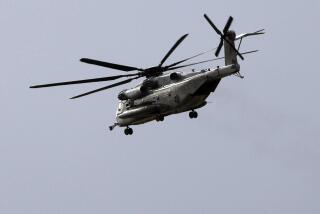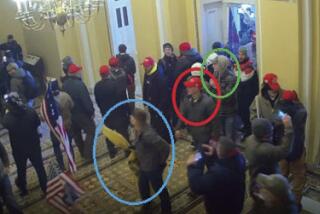In Somalia, Marines Feel the Loss of a Welcome Mat : Mercy mission: In wake of anti-American rioting, weary U.S. troops say it’s time to go home.
- Share via
MOGADISHU, Somalia — From his gunner’s position in the turret of a patrol Humvee, Marine Sgt. James Church was singing rock ‘n’ roll tunes and shouting “Howya doin’ ” to waving women and children Sunday as he swiveled and scanned the horizon of a suddenly hostile land.
Then the rock hit. Then came gunfire from a few hundred yards off. And, throughout the two-hour patrol, Church’s finger stayed close to the trigger of his mounted machine gun.
Sunday was, after all, the first day that Church, a 26-year-old San Diego native based at Twentynine Palms, had kicked back a bit while patrolling the dusty and bullet-pocked back lanes of Mogadishu.
For several previous days, he wasn’t singing. He was praying. And now, he and his thousands of Marine colleagues here are more than ready to go home--and for good reason, they said.
Under hails of rocks, burning tires, incoming bullets and even an occasional hand grenade from anti-American Somali protesters--among them people who days before had saluted and waved just as many did Sunday--Church had spent most of last week summoning up self-restraint to avoid opening up with a weapon that fires 1,000 rounds a minute.
And, amid the gentle smiles and thumbs-ups that greeted them Sunday, the occasional stones and nearby gunshots served as powerful symbols, confirming what the sergeant and two fellow Marines from the anti-armor platoon had been saying lately inside the armored vehicle they have used to patrol these streets for nearly three months now.
Their conclusion was unanimous: In the wake of anti-American rioting that targeted U.S. troops throughout the city last week, leaving several Marines injured and nearly a dozen Somalis dead, the Marines at the cutting edge of the U.S.-led operation dubbed Operation Restore Hope now believe they have worn out their welcome. It’s time to pull out, they said.
“It’s the same hatred they had before,” a deeply sun-tanned Church said, assessing Sunday’s mood on the same back streets where he’d been hit by stones two days before.
“It’s just hidden. Like their guns. I think we, both us and the Somalis, have irritated each other enough. Now it’s time for us to go back to being fathers and husbands and sons again. Our job is done. It’s as peaceful here as it’s going to get for now.”
Inside the Humvee, Sgt. Mike Kowalski, a veteran of five deployments overseas who is due to leave the Marine Corps in July, put it even more strongly.
“At first you had that feeling of doing some good. But not anymore. Three months now, and nothing has changed. We keep telling the Somalis, ‘We’re here to help. . . .’ But they don’t want our help. That’s obvious. I believe there was a need for us to be here. It needed to be done. But now, I don’t see any reason for us to be here any longer.”
And in the Humvee driver’s seat, Lance Cpl. Daryl Desimone was asked if he thought the riots may force the Marines and the other U.S. troops now deployed throughout Somalia to stay beyond expected departure dates ending in mid-April. He replied: “That’s what S-5 says. There is no S-5, of course. That’s what we call rumor control. But it would be a mistake. The Somalis don’t seem to want us here anymore, and we certainly don’t want to be here anymore.”
In reality, dozens of Somalis interviewed on the streets of Mogadishu as they limped back to life over the weekend stressed that they do want the Marines to stay.
The Marines and thousands of troops from other nations now in Somalia have been the only symbol of order in a nation that endured two years of bloody anarchy and deadly famine. Most Somalis believe that the U.N.-controlled international peacekeeping force that will inherit the operation from the Americans will be too weak and unpopular to prevent a return to the rampant armed conflict and chaos that had engulfed the nation before the Marines landed in December.
But even pro-American Somalis conceded that grass-roots support for the Marines has eroded in recent weeks, particularly after a militia under the command of Mohamed Siad Hirsi, a much-hated son-in-law of ousted Somali dictator Mohamed Siad Barre, took over parts of the southern port city of Kismayu last week. This was on the day U.S. forces were scheduled to turn the town over to U.N. control.
The Kismayu action by Siad Hirsi, known as Gen. Morgan, touched off the three days of rioting here in the capital that left one Marine in Church’s platoon blinded in one eye. Morgan is a foe of Mohammed Farah Aidid, one of this capital’s most powerful warlords, who had a major hand in overthrowing the unpopular Siad Barre.
In fact, peace was restored here Saturday only after U.S. forces in Kismayu drove Morgan’s men out of the city, placing the general and about 400 of his best-trained troops in a compound under U.S. Army control near the Kenyan border. Patrols like Church’s also fanned out into Mogadishu’s riot-torn streets, dropping leaflets that denounced Morgan and denied that U.S. elements had helped him take over Kismayu.
And U.S. special envoy Robert B. Oakley helped restore the semblance of order that greeted Church’s Sunday patrol by broadcasting a firm statement on Radio Mogadishu that condemned Morgan and his actions in Kismayu.
Inside the Humvee, the Marines on patrol showed an extraordinary awareness of the events that triggered the rioting against them, as well as a genuine sympathy for their attackers and a warning to anyone who will listen that it easily could happen again.
“If we were helping Morgan come to power, they would have been justified in attacking us,” Desimone said as he turned up another dusty lane of waving hands and broad smiles. “And I think the people who caused it, if they had good reason to do it again, it sure wouldn’t be hard to imagine. It could happen real easy. Just hope we’re not here to see it.”
The Marines may well get their wish.
Keenly aware of the growing negative sentiments, U.S. officials in Somalia said in the wake of the rioting that they remain committed to a long-term strategy that would sharply curtail America’s high military profile on the streets. That strategy would end patrols such as Church’s and send most of the troops home but expand a lower-key U.S. diplomatic presence within the U.N. peacekeeping operation that is scheduled to take over the operation in a little more than a month.
The risk of getting bogged down in a nation where the welcome has run out--shades of Beirut, according to many of the Marines interviewed Sunday, where more than 200 Marines died in a suicide truck bombing--is just one factor, those officials said.
Cost is another.
According to Oakley, a typical day like Sunday in Somalia costs U.S. taxpayers between $30 million and $40 million, and much of that expense comes out of the U.S. Marine Corps budget.
Briefing reporters on America’s future strategy for Somalia during dinner at his Mogadishu compound Saturday night, well after the dust had settled from the riots, Oakley indicated that Washington’s most urgent goal is convincing the Somalis that they can--and will--be forced to live without the large U.S. military presence on the streets and that the U.N. force and its new Turkish commander are capable of keeping the peace after they assume command of the operation.
“The U.S. is trying to signal in every way that we don’t have any long-term interests in Somalia,” Oakley said. “We want this operation to succeed as a U.N. operation--not a U.S. operation.”
Oakley, who is scheduled to end his tour of duty and leave Somalia on Wednesday after three months of painstaking diplomatic work to pacify Somalia’s rival armed clans, confirmed that the U.S. military leaders are as eager as their troops to pull up stakes.
“They’re being strained, and they don’t appreciate the slowness of the United Nations,” Oakley said of the U.S. commanders.
But Oakley also confirmed that the United States plans to maintain an influential, although far-lower-profile, role in Somalia after the bulk of the U.S. troops are sent home.
In the near future, he said, an American will be named to replace the special U.N. representative in charge of all operations in Somalia, a post currently held by an Iraqi. And he said there are plans to deploy a large team of U.S. Foreign Service specialists and political and development experts from the State Department to key regional centers throughout the country.
“We want to be in a supporting role here,” he said. “We do not want to be in a lead role.”
Inside Church’s Humvee, Oakley’s farewell assessments came as welcome news Sunday.
And when two U.S. journalists who had accompanied them on their first post-riot patrol passed the news on to their Marine colleagues at the battalion’s crude headquarters inside a bombed-out Mogadishu soccer stadium, there were smiles all around.
“We’ve got to remember we’re in their house,” Staff Sgt. Timothy Thomas, a native of the Bronx, said of the people his 1st Battalion of the 7th Marines had come from Twentynine Palms to help feed and protect.
“If you stay in somebody’s house too long, you wear out your welcome. And that’s what’s happening here.”
The Marines appeared to be unanimous about wanting to stop being guests. They have been living for nearly three months in a blown-out stadium so grim they’ve nicknamed it “The Barn” and “The Thunderdome,” a reference to the torture-chamber combat arena in the Mad Max U.S. film trilogy.
“The stadium is a depressing place,” Kowalski said. “Just boredom when we’re there, and this sort of stuff (the constant tension) when we go out on patrol.”
As he listened to his colleagues, Church wiped the sweat from his face and shook his head.
“People just aren’t going to be as easy with us if we stay on much longer,” he said, glancing up toward his gun turret. “And, as time goes on, it’s going to be harder and harder for us to maintain our composure. That’s not good for anyone.”
More to Read
Sign up for Essential California
The most important California stories and recommendations in your inbox every morning.
You may occasionally receive promotional content from the Los Angeles Times.













